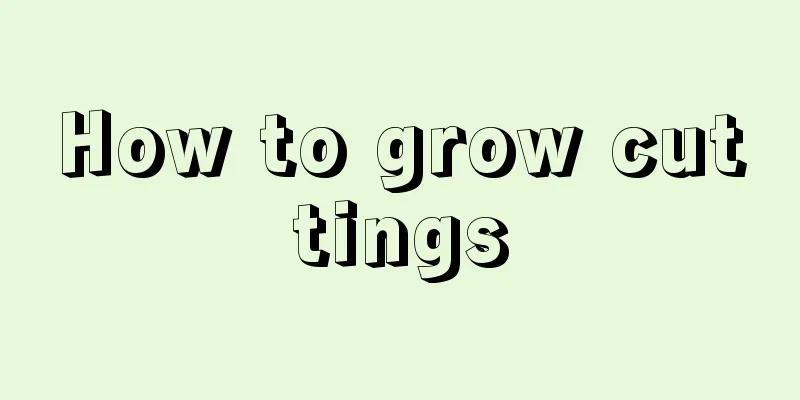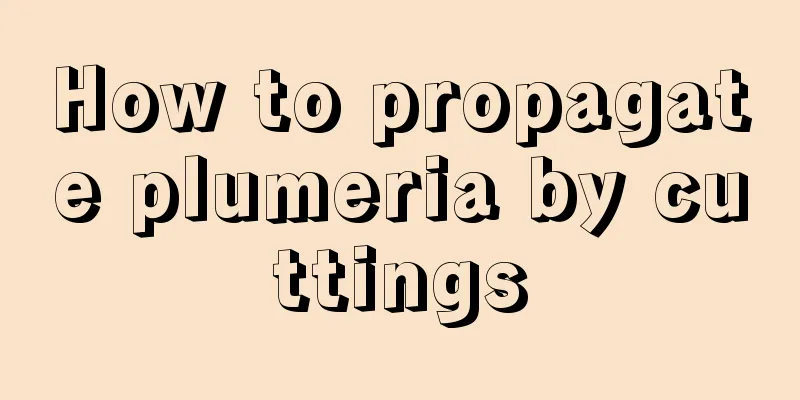How to grow cuttings

Seedling-shaped five-point harvestAfter the plant has rooted, depending on the variety and the size of the cuttings, you should first choose a small pot of 5 to 12.5 cm, and then change the pot once for maintenance according to the principle of changing from small to large. Usually, a gauze mesh is laid at the bottom of the flowerpot, and 1/3 of soil containing organic matter is put in. A small amount of slow-release fertilizer is added, and the seedlings are planted. The soil is filled to 80% to 90%. After compacting the soil, water it thoroughly to ensure that the roots are in full contact with the soil. After just 1 to 2 weeks in the pot, because the root system is relatively small, you need to ensure sufficient humidity. Some plants need to be covered with plastic bags to keep them moist and gradually moved to the sun for maintenance. Pinching promotes branchingDuring the growth stage of the seedlings, in order to ensure that the plants are full, it is necessary to pinch the seedlings and remove the top buds in time. After one pinching, 2 to 3 side buds can grow, and after a second pinching, 4 to 6 side buds can grow. For foliage and flowering plants, their ornamental value will be greatly improved. Note that after pinching, you should water the plant with a thin layer of fertilizer to ensure adequate nutrients to promote the growth of side branches. Plug tray seedlingsDuring the growth process of the seedlings, they are raised in plug trays or sponge blocks, which can provide sufficient growth space for the seedlings. After the seedlings are planted in the plug tray and grow slight roots, move the seedlings to a bright place and provide them with a small amount of light and a small amount of nutrients. But if roots grow and the seedlings can be easily taken out, it proves that the roots are well integrated with the soil and have grown into a mass. If you plant these soil balls with roots directly in flower pots, they will soon come to life. Because the seedlings have sufficient root systems, they can adapt to the environment quickly and have a good buffering ability against environmental changes. The survival rate of planting will be higher than that of ordinary cuttings. |
<<: When choosing flowers, first look at the indoor light
>>: Here's what you need to know about pruning
Recommend
When does jasmine bloom?
1. Flowering time Generally speaking, jasmine blo...
The difference between golden bud flower and shrimp flower
Different flowers The flowers of the goldenrod ar...
How to maintain Huayueye in winter and summer
Winter maintenance methods Under low temperatures...
Does tea prefer shade or sun?
Does tea prefer shade or sun? Tea leaves generall...
Lily Bamboo | Aquatic plants suitable for living rooms
Other Names Bamboo banana Habits It likes high te...
The efficacy and function of nail orchid
The efficacy and function of nail orchid The orna...
How much water to water gardenia
1. How much water to pour 1. Amount of water: It ...
Can lucky bamboo be watered with beer water?
Can lucky bamboo be watered with beer water? Luck...
Fig tree cultivation method
1. Lighting It likes light and should be kept in ...
When does ivy bloom?
1. Flowering period The natural flowering period ...
Is the iron begonia suitable for indoor placement?
Is the iron begonia suitable for indoor placement...
Preparation method of lithops soil
Lithops soil requirements Lithops, like cactus, i...
How to prune Vinca rosea
1. Pruning before flowering Pruning is required d...
What are the cultivation methods and precautions of Daphne odora?
Growth habits of Daphne koreana Osmanthus fragran...
Is Cyclamen suitable for indoor cultivation?
1. Is it suitable? Cyclamen is not suitable for i...









